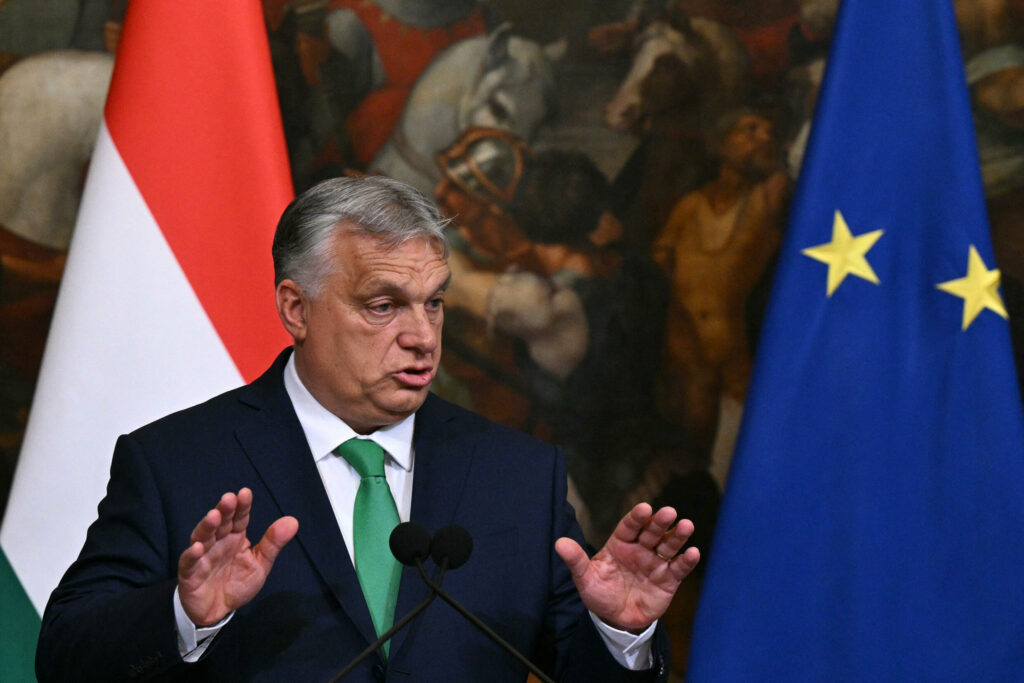To display this content from , you must enable advertisement tracking and audience measurement.
Accept
Manage my choices
TALKING EUROPE © FRANCE 24
On July 1, as Budapest takes the EU helm, another symbolic move will set the tone for the months ahead.
A champion of Europe’s “Christian values”, the Hungarian government will organise a “mass for Europe” at Bussels’ Roman Catholic cathedral, hoping for an auspicious start to its presidency.
The policy roadmap unveiled by Boka is equally marked by Orban’s conservative ideology. It includes a focus on tightening the EU’s external borders, reducing illegal immigration and promoting a “farmer-oriented agricultural policy”.
In other words, issues relating to the rule of law and the environment, two priorities of the previous Belgian presidency, will likely be pushed to the back of the queue.
Orban the dinner host
While countries at the EU helm get to chair meetings and steer the agenda, their actual powers remain limited.
As the European Council’s own website puts it, “(t)he role has been likened to someone hosting a dinner, making sure their guests all gather in harmony – able to express differences during the meal but leaving on good terms and with a common purpose.”
The timing of the “dinner” hardly plays in Orban’s favour.
Second-semester presidencies are typically truncated by the summer holidays, meaning little happens over the first few months. The recent European elections, and subsequent jockeying for alliances and positions, also mean Hungary is taking over at a time when EU decision-making is largely on hold.
“The EU is currently in a transitional phase. Between the appointments to the European Commission and the European Parliament, nothing major is likely to happen until December,” says Joannin. “In fact, this presidency, which some people fear, comes at a rather opportune moment that will limit Viktor Orban’s ability to cause trouble.”
Moreover, member states appear to have already reached an agreement on the EU’s coveted top jobs, effectively sidelining nationalist and populist parties that were hoping to gain greater sway in the nominations following their strong showing in the recent European polls.
On Wednesday, German Chancellor Olaf Scholz confirmed that the bloc had agreed to extend Ursula von der Leyen’s mandate as head of the powerful EU Commission. Former Portuguese prime minister Antonio Costa, a Socialist, has been tapped to head the European Council, while Estonian Prime Minister Kaja Kallas, representing the liberal camp, has been selected to serve as the EU’s top diplomat.
“EU leaders raced to find an agreement in order to ensure Orban would have no influence over the nomination process,” says Stetter.
Indeed, the Hungarian leader was quick to slam a deal that “flies in the face of EU principles”. He added: “Far from being inclusive, it sows the seeds of division.”
Isolated and under pressure
The recent surge in support for nationalists and Eurosceptics across the EU belies a weakening of Orban’s iron grip on his own country, which he has ruled for the past 14 years.
While his Fidesz party took almost 45% of the vote in this month’s European elections, it was its worst result since the country joined the EU in 2004. His main opponent, Péter Magyar, achieved a breakthrough by winning seven of Hungary’s 21 seats in the European Parliament.
Read moreHungary’s Peter Magyar, Orban-disciple-turned-fierce-rival
“Viktor Orban is also isolated among the EU’s radical right-wing parties,” says Joannin. “For instance, Italy’s Giorgia Meloni and her European Conservative and Reformists (ECR) group disagree with Orban on Ukraine and immigration. Italy has a high influx of migrants and would like them to be distributed across the EU, something Orban refuses.”
Given the history of fraught relations between Hungary and Brussels, EU members are likely to keep a close tab on Orban’s presidency.
“Before taking up the job, Orban paid visits to Berlin, Paris and Rome to determine the red lines he mustn’t cross,” says Joannin.
Hungarian officials have sought to reassure their partners, with the country’s EU ambassador Balint Odor promising “a presidency as usual – we’ll act as an honest broker”. Other diplomats have cautioned that Orban will seek to stamp his mark, despite the limited room for manoeuvre.
“His EU partners have known him for a long time now and are familiar with his taste for theatrics,” says Stetter. “But Orban also knows he is dependent on the EU.”
The Hungarian leader has good reason to play ball with his partners over the coming months. His conduct is likely to determine the fate of some €19 billion in EU funds for Budapest that have been frozen over issues including LGBTQ rights, the treatment of asylum seekers and the fight against corruption in public procurement.
This article is a translation of the original in French.
Source link : https://www.france24.com/en/europe/20240628-eu-holds-its-breath-as-hungary-s-orban-vows-to-make-europe-great-again
Author :
Publish date : 2024-06-28 17:11:10
Copyright for syndicated content belongs to the linked Source.
